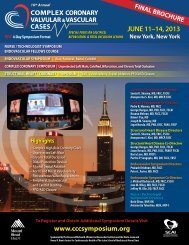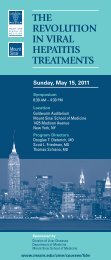WOM N WOM N - Mount Sinai Hospital
WOM N WOM N - Mount Sinai Hospital
WOM N WOM N - Mount Sinai Hospital
Create successful ePaper yourself
Turn your PDF publications into a flip-book with our unique Google optimized e-Paper software.
frequent screenings or screenings to begin at an earlier<br />
age than for the general population.<br />
Ms. Brown indicated that women do not have to<br />
be patients at <strong>Mount</strong> <strong>Sinai</strong> to utilize the services of the<br />
Genetics Department. Physicians may refer patients<br />
for genetic counseling, but many come on their own<br />
initiative. This confirms what I have learned talking to<br />
many women during the years since my diagnosis.<br />
In addition to genetic testing for BRCA mutations,<br />
some women with endometrial (uterine) or<br />
ovarian cancer are offered genetic testing for Lynch<br />
Syndrome, usually referred to as HNPCC (Hereditary<br />
Nonpolyposis Colorectal Cancer). HNPCC is a<br />
condition in which a tendency to develop colorectal<br />
and certain other cancers is inherited (Nonpolyposis<br />
means that the colorectal cancer can occur when<br />
only a small number of polyps are present in the<br />
colorectal region or when polyps are not present<br />
at all). HNPCC accounts for 2–3% of all colorectal<br />
cancer; however, polyps in these individuals can<br />
ROBIN ZAREL<br />
ADVISORY BOARD MEMBER<br />
Woman to Woman BRCA Stories<br />
Robin was 36 when she had her first breast cancer in<br />
1991, and 39 when diagnosed with ovarian cancer.<br />
A few years after her treatment for ovarian cancer,<br />
she happened to receive a brochure in the mail from<br />
the Strang Cancer Center about genetic testing. She<br />
decided to look into it. Robin had no family history of<br />
either cancer. “I wanted to know why all this happened<br />
to me,” she explained.<br />
Robin tested positive but did not elect to have a<br />
prophylactic mastectomy at that time. However, when<br />
she developed a second primary cancer in the same<br />
breast in 2004, she elected to have a double mastectomy.<br />
It has given her peace of mind. And she’s quite confident<br />
about her ovarian cancer. Although she was diagnosed<br />
in Stage III, she has survived 15 years.<br />
become cancerous more quickly than in the general<br />
population. There is up to an 80% chance that a<br />
man or woman with HNPCC will develop colorectal<br />
cancer over his or her lifetime and up to a 60%<br />
chance that a woman with HNPCC will develop<br />
uterine cancer. Additionally, the lifetime risk of<br />
ovarian cancer is approximately 10% for women<br />
with HNPCC. Other cancers linked to HNPCC<br />
are those of the stomach, small intestine, bile duct<br />
and gallbladder, urinary tract, and pancreas.<br />
Three of the genes that account for the majority of<br />
HNPCC (MLH1, MSH2, and MSH6) can be analyzed<br />
through a blood test. Testing is considered according<br />
to the pattern of cancer in a family. Families with<br />
three or more cases of HNPCC-related cancers<br />
in two or more generations, with at least one<br />
affected family member diagnosed under the<br />
age of 50, are considered to have HNPCC. Testing<br />
is also appropriate for individuals diagnosed with<br />
two HNPCC-associated cancers or colorectal or<br />
uterine cancer under the age of 50.<br />
Unlike the BRCA mutations, HNPCC<br />
is not more common among people of<br />
Jewish descent.<br />
Knowledge of this condition can<br />
help determine a need for frequent<br />
cancer screenings, preferably starting at<br />
an early age. Genetic testing, however,<br />
is not available for all HNPCC-causing<br />
genes. In addition, in some high-risk<br />
families, genes other than those associated<br />
with HNPCC may account for the<br />
increased colorectal cancer risk. Therefore,<br />
in high-risk families, where no<br />
mutation has been detected, individuals<br />
need to consult with their doctors<br />
to determine the best screening practices<br />
to follow. For women with a personal<br />
and/or family history suggestive of HN-<br />
PCC, besides an annual gynecological<br />
exam and early, frequent colonoscopies,<br />
doctors may recommend pelvic ultrasounds<br />
and/or uterine biopsies to screen<br />
for cancer of the uterus or ovaries.<br />
Both HNPCC and BRCA mutations<br />
are inherited in an autosomal<br />
dominant pattern. That means that each<br />
time a person has a child, there is a 50%<br />
(or 1 in 2) chance that the child will inherit<br />
the mutation or condition. Children<br />
who do not inherit it cannot pass it on<br />
to their own children; it does not “skip<br />
generations.” Again, not everyone who<br />
inherits the BRCA mutation or HNPCC<br />
will develop cancer. Siblings of a person<br />
with HNPCC or a BRCA mutation have a<br />
50% chance of having inherited it.<br />
Many insurance companies cover<br />
the cost of testing and most people<br />
use their insurance, Ms. Brown said. Some people<br />
prefer to pay out-of-pocket for genetic testing<br />
because they worry that the information might be<br />
used against them if it is included in their medical<br />
records. However, federal and state laws are in<br />
place to help protect individuals from genetic<br />
discrimination. Genetic test results may not be used<br />
by a health insurance company or employer when<br />
making decisions about coverage or employment.<br />
Now, to summarize the reasons for considering<br />
undergoing any type of genetic testing: Many<br />
women ask, why be tested if they already have<br />
developed cancer? Ms. Brown explains that it helps<br />
people make better and more informed medical<br />
management decisions. Gaining knowledge about<br />
genetic risk allows one to increase surveillance<br />
(medical observation) and take preventive measures.<br />
JOYCE MANHEIMER<br />
SURVIVOR VOLUNTEER<br />
Woman to Woman BRCA Stories<br />
“I wanted more information because I had three cancers:<br />
breast, uterine, and early-stage ovarian, within two years.<br />
I wasn’t reluctant to have the tests. If they are available<br />
to me, I would be foolish not to take advantage of them,”<br />
Joyce told me.<br />
She had the BRCA and HNPCC testing. Joyce learned<br />
that she tested negative but no longer thinks about how<br />
all this happened to her. Her mother had three different<br />
cancers and did not dwell on it after she was treated. Joyce<br />
adopted her mother’s attitude; that is, “I am a healthy<br />
individual, I was treated, and I move forward.”<br />
In addition, pinpointing an inherited cause of cancer<br />
can allow informative testing for other relatives.<br />
Testing has the potential to reduce uncertainty and<br />
anxiety about who in the family is at increased<br />
risk for cancer.<br />
One purpose of Woman to Woman is to inform and<br />
educate in order to empower women.<br />
It has been my experience that discussion of<br />
genetic counseling and/or testing is feared and<br />
avoided when it should be understood and utilized to<br />
save our lives and those of our family members. Just as<br />
we need to know symptoms, we need to understand<br />
newly discovered information. Genetic counselors,<br />
along with our doctors, can teach us and help us<br />
to appreciate whatever knowledge does exist about<br />
our illnesses. —VIVIAN PORT<br />
| THE NEWSLETTER | 11<br />
(Left to Right) Arden Moulton, LMSW, and Alison Snow, LCSW, Recipients of the<br />
Susan Blumenfield Award for Clinical Excellence; Maura Surnamer, President of<br />
the Auxiliary Board; and Dr. Susan Bernstein, Director of Social Work Services.<br />
ARDEN MOULTON, LMSW, <strong>WOM</strong>AN TO <strong>WOM</strong>AN<br />
PROGRAM COORDINATOR, RECEIVES ONE OF THE<br />
TWO DR. SUSAN BLUMENFIELD AWARDS FOR<br />
CLINICAL EXCELLENCE<br />
At the Department of Social Work Services Grand Rounds on March 11 of this year,<br />
our dear Arden received a very special award. Maura Surnamer, President of the<br />
Auxiliary Board, honored her with one of two Dr. Susan Blumenfield Awards, while<br />
Alison Snow, LCSW, an inpatient oncology social worker, received the other.<br />
Ms. Surnamer read comments written by those who nominated both Arden and<br />
Alison. She noted that Alison, who has been at <strong>Mount</strong> <strong>Sinai</strong> since 2004, has established<br />
herself as “an exceptional patient advocate” who is dedicated to oncology services and<br />
works to insure their prominence at <strong>Mount</strong> <strong>Sinai</strong>. “Alison is the real thing,” she said,<br />
“caring, compassionate and self-motivated.” Woman to Woman survivor volunteers<br />
know personally how important a caring, compassionate, and effective social worker is<br />
at this difficult time. Congratulations from all of the survivor volunteers, Alison.<br />
Arden was described as the creative force behind Woman to Woman. As one<br />
colleague noted, “Arden took the vision of a peer-to-peer support initiative and made<br />
it flourish.” Another said that Arden has built Woman to Woman into a prototype for<br />
peer-to-peer support programs nationwide.<br />
We volunteers feel so strongly that she makes the work we do possible, on a very<br />
personal level. One volunteer said that “Arden literally helped save my soul, enabling me<br />
to craft a meaningful life after cancer…She has guided me with a firm but gentle hand<br />
toward the realization that by helping other women, I am helping myself.”<br />
When I meet with patients, their faces light up when Arden’s name is mentioned,<br />
even after surgery or during chemotherapy. It is no wonder that the Auxiliary Board<br />
selected our very own Arden to receive the award in its inaugural year. All the Woman<br />
to Woman survivor volunteers are very thankful for her exceptional personality and<br />
professional leadership. Congratulations, Arden! —VIVIAN PORT


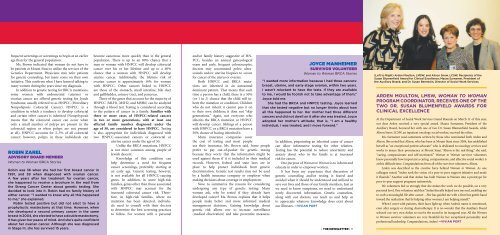
![December 2, 2012 [PDF] - Mount Sinai Hospital](https://img.yumpu.com/51092274/1/190x245/december-2-2012-pdf-mount-sinai-hospital.jpg?quality=85)
![January 21, 2013 [PDF] - Mount Sinai Hospital](https://img.yumpu.com/50916550/1/190x245/january-21-2013-pdf-mount-sinai-hospital.jpg?quality=85)
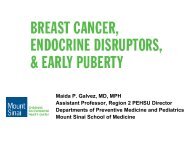
![February 3, 2013 [PDF] - Mount Sinai Hospital](https://img.yumpu.com/50584982/1/190x245/february-3-2013-pdf-mount-sinai-hospital.jpg?quality=85)
![March 18, 2012 [PDF] - Mount Sinai Hospital](https://img.yumpu.com/50462098/1/190x245/march-18-2012-pdf-mount-sinai-hospital.jpg?quality=85)

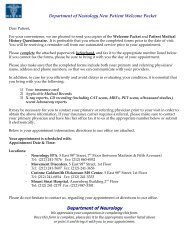

![Partners Program Guide [PDF] - Mount Sinai Hospital](https://img.yumpu.com/49411954/1/190x245/partners-program-guide-pdf-mount-sinai-hospital.jpg?quality=85)
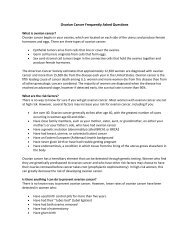
![March 19 - April 1, 2012 [PDF] - Mount Sinai Hospital](https://img.yumpu.com/48990923/1/190x245/march-19-april-1-2012-pdf-mount-sinai-hospital.jpg?quality=85)
![PGY-1 Residency Application [PDF] - Mount Sinai Hospital](https://img.yumpu.com/48577701/1/190x245/pgy-1-residency-application-pdf-mount-sinai-hospital.jpg?quality=85)
